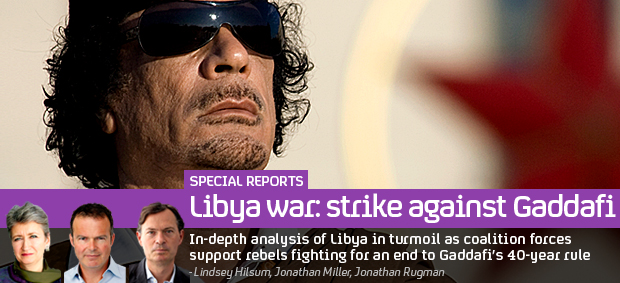Gaddafi regime taunts UK over general’s death
As it emerges Libyan rebel general Abdel Fatah Younes was killed by an Islamist militia fighting on his own side, the Gaddafi regime describes the death as a “slap in the face’ for the UK.
Libyan government spokesman Moussa Ibrahim said the killing of General Younes was “a nice slap to the face of the British, that the council that they recognised could not protect its own commander of the army”.
Mr Ibrahim went on to claim that al-Qaeda was responsible for the death. Details of the events surrounding the general’s death remain unclear, although the rebels claim the commander and two aides were killed by gunmen after being recalled from the front.
“By this act, al-Qaeda wanted to mark out its presence and its influence in this region,” Mr Ibahim said.
“The other members of the National Transitional Council (NTC) knew about it but could not react because they are terrified of al-Qaeda.”
By this act, al-Qaeda wanted to mark out its presence and its influence. Moussa Ibrahaim, Libyan government spokesman
But other sources maintain Younes’s death was the work of an Islamist group within the rebel alliance. Rebel minister Ali Tarhouni said Younes had been killed by fighters who went to fetch him from the front.
Mr Tarhouni said a militia leader had been arrested and had confessed that his subordinates had carried out the killing.
General Younes joined the anti-government rebels at the start of the Libyan uprising in February, having served at the heart of the Gaddafi regime since 1969. Some rebels were reportedly uncomfortable working under a man with such a long association with Colonel Gaddafi.
On Wednesday UK Foreign Secretary William Hague announced that Britain was recognising the NTC, following similar moves by France and the United States.
Remaining pro-Gaddafi diplomats were expelled from Britain, and the Libyan embassy in Knightsbridge was handed over to the rebel council.
Mr Hague said the move would allow the UK to offer greater practical assistance to the rebels, starting with the unfreezing of £91m worth of assets belonging to the NTC-controlled Arabian Gulf Oil Company.
Al-Qaeda threat
In March a Libyan rebel leader from Derna, east of the rebel stronghold of Benghazi, told the Italian newspaper Il Sole 24 Ore he had recruited "about 25" Libyans to fight alongside insurgents in Iraq, claiming some had now returned and were fighting Gaddafi forces in Ajdabiya.
Abdul Hakin al-Hasidi's words stoked fears that Libya's rebel movement was not made up simply of west-loving democrats but included - as Colonel Gaddafi has repeatedly claimed - a significant al-Qaeda element.
Read more: Libya's rebel movement - radicals or democrats?
